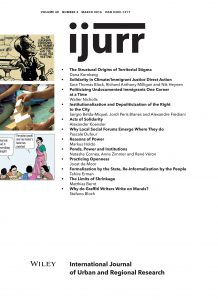Situating Strain within Late Modernity
Robert K. Merton, in 1938, began delving into how societal arrangements could create, maintain, and exacerbate social tension and individual stress. His theory of ‘strain’ – tremendously oversimplified – proposes that crime/deviance becomes more likely when a disjuncture exists between culturally derived ends (i.e. monetary success) and what the social structure makes possible. This theoretical framework, from its onset, has been the focus of numerous efforts; being tested, criticized, buttressed, and modified to increase its viability. As a result, sociology...



1475-682X/asset/akdkey.jpg?v=1&s=eef6c6a27a6d15977bc8f9cc0c7bc7fbe54a32de)
1756-2589/asset/NCFR_RGB_small_file.jpg?v=1&s=0570a4c814cd63cfaec3c1e57a93f3eed5886c15)